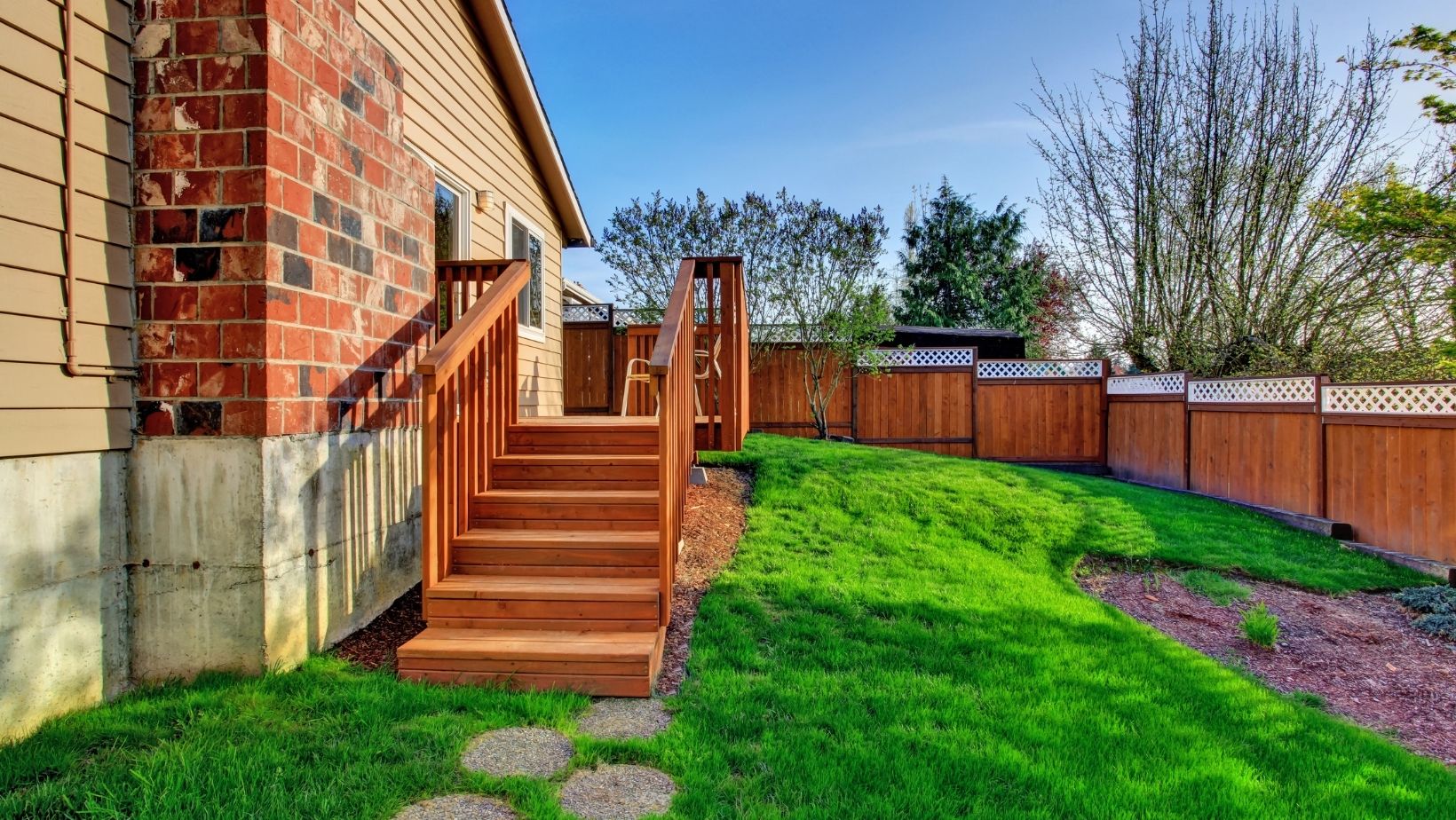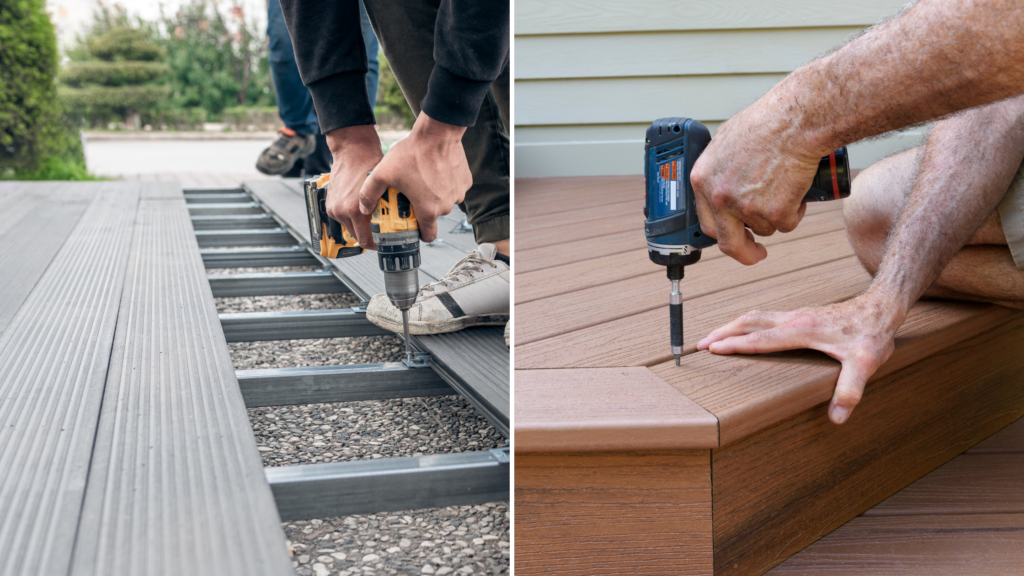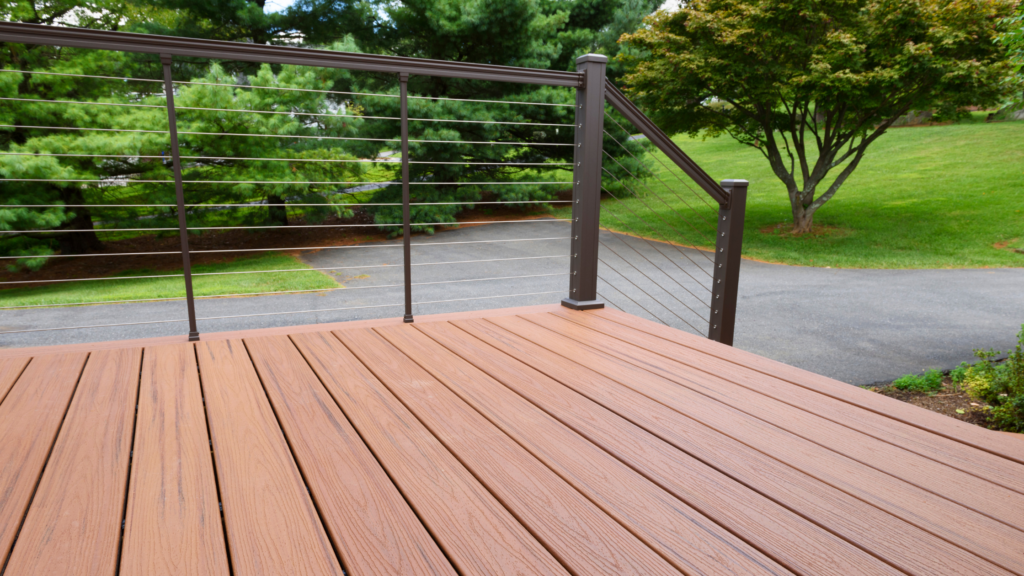
composite deck
+1 (204) 789-7826
We are the #1 fence and deck builders in Morden, MB as well serving most of Southern Manitoba – Altona, Morris, Carman, Morden, Winkler, Portage La Prairie, Pembina, Steinbach, Roseau River and neighboring towns.
Request a free quote
A composite deck is an excellent addition to any house. Whether you want a beautiful new deck or want to replace your old deck, composite decking from Morden Fence and Deck Builders is the way to go.
Composite decks are a popular choice because they can not only last for a long time, but they also offer a unique aesthetic and a great look. Morden Fence and Deck Builders has the right people, the right skills, and the right tools to tackle your composite deck needs in Southern Manitoba.

Composite deck as an alternative to wooden deck
Composite decking is affordable and durable alternative to wooden decks. Since the popularity of composite deck in the 1990s began, the technology and advancements to it has been dramatic. There’s more manufacturers and options available in the market now than ever before, so it’s hard to know about what to look for and what to watch out for.
Composite can be more expensive than wood, but it also comes with its fair share of advantages and disadvantages. Here are some things to know before purchasing composite.
The Different Types of Composite decking
There are different types of composite that specialize for different things. Most composite materials are made up of recycled plastics and repurposed wood fibers.
The composites are available in non-capped, partially capped, or fully capped varieties, which have their own characteristics. Here are some things to know about these varieties.
Non-capped Composites
The non-capped composite is composed of wood fiber and plastic mix. The boards are shaped into a normal wood plank. However, it’s not possible to make it look like real wood. The original composite decking products were uncapped, but has been phased out of the market due to the constant advances in technology and warping. Some manufacturers still carry the uncapped types, and are usually less expensive and have a modest fade.
Capped Composites
To fix the flaws that the original iterations of composite decking faced, manufacturers made the capping technique. This type of composite includes a composite core and a hard PVC outer layer on 1-3 sides which helps to protect against scratches, stains, and fading. Capped composites also warp more easily than non-capped materials, which can be a disadvantage. Some capped composites have the PVC material wrapped around all four sides of the board, which makes it a better barrier against water. Ingress, bugs and termites, and warping.
Pure PVC
The pure PVC type does not include any wood fibers at all, and rather just high-grade plastics that include an ultra realistic wood look. Compared to its counterparts, pure PVC features fire resistance, first-rate heat dissipation, and a resistance to scratches. Because of its lightweight qualities, pure PVC is an ideal material to use for roof decks. Since pure PVC is a result of the advancements of the technology of composite, it can include a fade and stain warranty for up to 30 years and a lifetime warranty against termites, defects, and rot.
Composite Boards
Each shape of composite boards has its own special benefits and drawbacks. Here are some types of shapes and their effects.
Solid Shape
The solid shape is the most similar to a traditional wooden plank. Solid composite boards have a rectangular profile, like a wooden plank. Solid shape composites are mounted by screwing through the top of the boards, like wood. It can be a heavier shape than other types of shapes, but has a tough rigidity.
Slotted Shape
Slotted shape composites are just like the solid shape composites, but with a notch down either side of the board for use with a hidden fastening system. The hidden fasteners keep the PVC cap intact for protection and a beautiful deck surface, without screw holes. Certain manufacturers don’t coat the notch in the board with a protective PVC cap, which can lead it to be more exposed and vulnerable to water ingress and insect penetration.
Ridged Shape Boards
Only one side of a ridged shape board is usable, since the underside has cut-outs to reduce the overall weight and cost.
Hollow Shape Boards
This type of board is much lighter than the other types of composite boards, but is clearly plastic. End caps are used in the end of the board to block small animals and insects from nesting in the hollow space. Composite boards are also stronger than solid shape boards due to their ribbed centers. They also make great replacement boards because of their weight.

Composite Decks construction and Factors That Affect the Cost
Building a composite deck can be an easy DIY project, but we suggest leaving it to professional deck contractors like Morden Fence and Deck Builders.
You should also consider the technical qualifications of building a deck, which a professional deck builder usually covers.
There are also many factors that affect the cost to install a composite deck. From the type of composite you are planning to use, to the size you are planning to have your deck built. Here are some things to know.
- Permits
Finding out if building a deck on your property requires a permit is one of the most important things to know before you get started. You might need a permit if the deck exceeds a certain measurement. Check your local municipality by-laws for deck requirements and specifications.
- Supports and Joists for Composite Decks
Framing and supporting a composite deck rather than a wooden deck is not the same. Due to the plastic materials, composite needs strict support to avoid your deck from bowing and warping from the heat of the sun. To make the decks last longer, contractors wrap them with a UV-treated waterproofing membrane before installation. Composite decking can also come with a 20 year warranty or more.
- The Size of the Deck
Obviously, the bigger the deck you are planning to install, the more expensive. The bigger the deck also means the need to hire extra labor and more materials. Keep in mind that extra supports and joists might be needed, which will be another extra cost, especially if you are planning to have a curved fence deck. The simpler you plan to have the deck shaped (such as a square or rectangle option) the more affordable the cost will turn out to be.
- Customization
Consider the small details too, like if you are planning to have a certain area on your deck to put your plants on, or like an area to put your grill. You can also add railings, which can also be made of composite.
Composite deck railing
A composite deck railing may be included in your planned deck installation. It can be a bit more expensive, but requires less maintenance than a wooden deck railing.
Railings for composite decking generally have more advantages compared to wooden deck railings. Composite decks are strong and sturdy and come in a variety of different colors. Unlike real wood, composite railing does not require painting or staining, and it also comes without the risk of warping or splintering.

Here are some more things to know.
- Lifespan and Durability
If taken care of properly, the average lifespan of composite railing is 25-30 years, especially railings with high quality composites. Composite is also very good for protection against mold, mildew, stains and other vulnerabilities that wood have.
- Color Options
Composite railing options for color have a fairly wide range of variety. Certain manufacturers have a lot more options than other producers. An extended range of colors allows the composite to compliment its surroundings better. It all comes down to what you need, what suits your taste, and your budget.
Different types of low-maintenance composite deck railing options will need all different levels of maintenance. Generally, maintenance required for a deck railing is quite low. It’s also good to occasionally give your railings a scrub with a soft bristle brush to wash it off.
- Factors That Affect Cost
Obviously, the more railing you have planned to install, the more it will cost. Composites are also available in a wider range of quality than other materials, which can affect cost furthermore. The need for maintenance is lower than certain materials, but manufacturer warranties can be shorter than some other materials. Manufacturers can offer lower lifetime costs rather than products that require more intense materials.
Morden Fence and Deck Builders
Building composite decks for homes and businesses in Southern Manitoba – Altona, Morris, Winnipeg, Morden, Winkler, Carman, Steinbach, St. Adolphe, St. Anne
With several years of experience in fences, decks, pergolas, and more, we are the company you can trust to provide the highest quality materials, excellent workmanship and competitive pricing.
To make things easier for you, we provide a free, no-obligation estimate so you can get an idea how much your project will cost. Simply fill in the Free Estimate Form on the right or call us at +1 204-789-7826. One of our specialists will be in contact with you shortly to make sure you get the help you need!
FAQ’s about composite decks
How much does it cost to build a composite deck?
This is a tough question because the cost of a fully installed composite deck will depend on the type of job, the style of deck, and the materials that are used. One way to find out the price is to get an estimate from a local contractor like Morden Fence and Deck Builders. However, the average cost of a fully installed composite deck is about $25 – $50 per square foot. Call us at +1 204-789-7826 to get a free estimate.
Is composite decking expensive right now?
In general, composite decking is more expensive because it is a more durable, long-lasting material that requires less upkeep than wood. However, composite decking can turn out to be cheaper considering its longer useful life and less maintenance costs required. Not to mention, the increased home value it gives.
What are the problems with composite decking?
The biggest problem with a composite deck is that it can deteriorate with major swings in temperature causing it to peel, warp and split.
How long do composite decks last?
The average lifespan of a composite deck is 25-30 years. Composite decking requires minimal upkeep. However, even if composite decks are low maintenance, they still do require ocassional cleaning and maintenance work.
Can you pressure wash composite decking?
It is not recommended to pressure wash composite decking as the strong water pressure can strip and etch the composite decking material which is a softer material than natural wood.